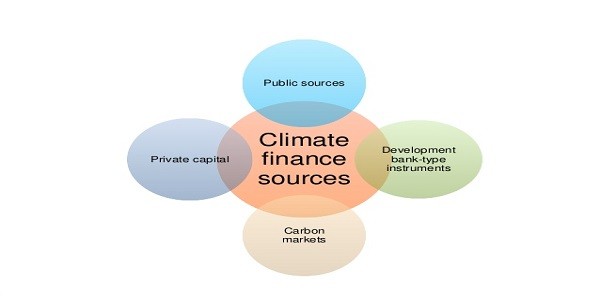November 2, 2023
Climate Finance: Building Trust and Overcoming Challenges

Introduction
- This article highlights the critical role of climate finance in global trust-building, emphasizing challenges like inequality, mandatory contributions, and political will. Concerns arise from insufficient funding, voluntary contributions, and disparities between pledged amounts and actual commitments.
Key Points
- Importance of Climate Finance
- Climate finance is essential for trust in climate change negotiations, especially in COP 28.
- A 1.1°C temperature increase intensifies demands for mitigation actions by developing countries.
- $100 Billion Commitment
- Developed countries committed to mobilize $100 billion per year by 2020.
- The Glasgow conference in 2021 reported only $79.6 billion mobilized, leading to concerns about insufficient funding.
- NDC Financial Needs
- Developing nations estimate financial needs close to $6 trillion until 2030.
- India’s NDCs highlight financial requirements of $206 billion for adaptation and $834 billion for mitigation.
Challenges
- Inequality in Contribution
- Developed countries exhibit disparities in fulfilling climate finance commitments.
- The U.S. contributes only 5% of its fair share, hampering effective mobilization of funds.
- Mandatory Contribution Framework
- The absence of a mandatory framework for developed nations to contribute poses a significant challenge.
- Lack of clear criteria for collecting funds creates uncertainty about achieving financial goals.
- Discrepancies in Pledged Amounts
- Contributions from only 25 out of 37 developed countries in the second replenishment of the Green Climate Fund.
- Shortfall in meeting pledges raises concerns about the reliability of financial commitments.
- Global Urgency Disparity
- Lack of political will and urgency among developed nations to address climate finance needs.
- This disparity impedes progress in protecting the global atmosphere.
Concerns
- Insufficient Funding
- $79.6 billion mobilized falls short of the committed $100 billion annually.
- Hinders the capacity of developing nations to transition to sustainable practices.
- Voluntary Contributions Challenge
- Inclusion of voluntary contributions by nine developing countries in the GCF introduces complexities.
- Challenge lies in establishing uniform criteria for contributions.
- Impact on Developing Nations
- Developing nations express financial needs close to $6 trillion until 2030.
- Gap between needs and actual mobilized funds poses a significant concern.
Analysis
- Crisis of Commitment
- Discrepancies between pledged amounts and actual contributions underscore a crisis of commitment among developed countries.
- This undermines the effectiveness of global climate finance mechanisms.
- Political Will Deficiency
- Lack of political will and urgency among developed nations reveals a critical deficiency.
- Urgent action is necessary to bridge the gap between commitments and tangible contributions.
Way Forward
- Transparent Burden-Sharing
- Establishing a transparent and agreed-upon burden-sharing formula among developed countries is crucial for fair and consistent contributions to climate finance.
- Mandatory Contribution Framework
- Implementing a mandatory framework for developed nations to contribute, accompanied by clear criteria for mobilizing funds, is essential to ensure reliability in financial commitments.
- Global Cooperation and Urgency
- Fostering a sense of urgency and global cooperation is imperative.
- A collective and urgent response is needed to address the critical climate finance needs effectively.
- Capacity Building
- Prioritizing capacity building in developing nations to facilitate a smooth transition to sustainable practices is crucial.
Conclusion
- Climate finance is essential for global trust in climate change efforts. Addressing challenges and implementing transparent, mandatory frameworks for contributions is crucial. Additionally, prioritizing capacity building in developing nations is essential for a sustainable future.
Daily Gist : The Hindu/Indian Express : 30 Jan 2025
January 30, 2025
Gist of editorial : the Hindu/ Indian Express/20 Jan 2025
January 20, 2025
Daily the Hindu/ Indian Express Editorial Gist: 14 Jan 2025
January 14, 2025
